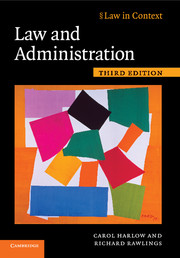Book contents
- Frontmatter
- Contents
- Preface
- Table of Cases
- Table of Statutes
- 1 Red and green light theories
- 2 The changing state
- 3 Transforming judicial review
- 4 Making the law
- 5 Rules and discretion
- 6 Regulation and governance
- 7 Regulatory design and accountability
- 8 Contractual revolution
- 9 Contract, contract, contract
- 10 Into the jungle: Complaints, grievances and disputes
- 11 Tribunals in transition
- 12 The Parliamentary Ombudsman: Firefighter or fire-watcher?
- 13 Inquiries: A costly placebo?
- 14 Continuity and change: Procedural review
- 15 Elite dimension: Court structures and process
- 16 Judicial review and administration: A tangled web
- 17 ‘Golden handshakes’: Liability and compensation
- Index
6 - Regulation and governance
Published online by Cambridge University Press: 05 June 2012
- Frontmatter
- Contents
- Preface
- Table of Cases
- Table of Statutes
- 1 Red and green light theories
- 2 The changing state
- 3 Transforming judicial review
- 4 Making the law
- 5 Rules and discretion
- 6 Regulation and governance
- 7 Regulatory design and accountability
- 8 Contractual revolution
- 9 Contract, contract, contract
- 10 Into the jungle: Complaints, grievances and disputes
- 11 Tribunals in transition
- 12 The Parliamentary Ombudsman: Firefighter or fire-watcher?
- 13 Inquiries: A costly placebo?
- 14 Continuity and change: Procedural review
- 15 Elite dimension: Court structures and process
- 16 Judicial review and administration: A tangled web
- 17 ‘Golden handshakes’: Liability and compensation
- Index
Summary
Essence
Regulation is of the essence of administrative law, constituting much of the interface between the state and the individual or ‘legal persons’. To a greater or lesser extent, and in a myriad of different ways, citizens, small business, large corporate and even multinational enterprise fall into its domain. As prime machinery of governance, regulation has epitomised the contemporary mixing in administrative law of public with private powers: ‘steering not rowing’. The recent UK process of regulatory reform itself is an archetypal example of domestic administrative law development in a global context.
Regulation wears a distinctly ‘green light’ hue as one of the chief instruments for the achievement of policy objectives. Epitomised today in the rise of ‘the regulatory state’, its day-to-day workings are of the first importance in the functioning economy. As such, regulation is a hot topic of political debate: not least when some ‘disaster’ occurs as with the current credit crunch. The style and substance of regulation connects in turn with competing – shifting – views of the role of the state. According to a recent, highly influential, report to government:
The world in which regulators operate continues to change, both with the pressure on business of a more competitive world, and the changing regulations that need to be enforced. As a society, we have increased expectations that regulations can and will protect consumers, businesses, workers and the environment, coupled with an increasing need to keep our businesses efficient and flexible to face new competitive challenges. Our regulatory system has the pivotal role in resolving the regular conflict between prosperity and protection.
- Type
- Chapter
- Information
- Law and Administration , pp. 233 - 281Publisher: Cambridge University PressPrint publication year: 2009



